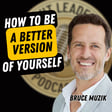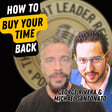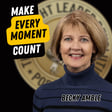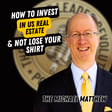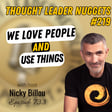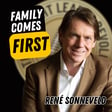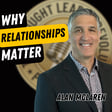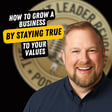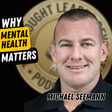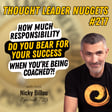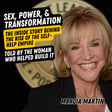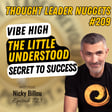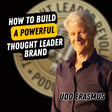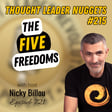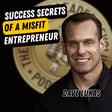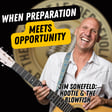Become a Creator today!Start creating today - Share your story with the world!
Start for free
00:00:00
00:00:01

EP124: Tim Arnold - How To Spark Change & Realize Your Potential
Do you feel stuck? If so, overcoming your possible fear of change can help. Our guest, Tim Arnold, who is the President of Leaders for Leaders and author of The Power Of Healthy Tension, has spent over two decades helping organizations unite teams, spark change and get unstuck, with clients that include the United Nations, Citibank, KPMG, Toyota, and Siemens. He provides his clients with a real world perspective through his experience launching successful for-profit and not-for-profit businesses, overseeing community outreach and healthcare programs, and managing international development partnerships in four continents. During this interview, you’ll discover…
- The importance of having a great mentor
- Top 5 skill sets that are a well-rounded way to leverage your expertise
- Figuring out what you actually love to do
Transcript
Choosing a Career Path
00:00:00
Speaker
Think about what you're good at. Think about certainly where the work is. Think about, you know, where your skills are. But also think about things like the environments you like to be in, the kind of stuff that, you know, makes you come to life. You know, I would have focused really on the things that you're only skilled at. So it was really good in math.
00:00:17
Speaker
good in accounting. So obviously, you know, that's where you end up. But I never asked my question, what I actually love to do. And you know what, what is truly life giving, you know, when I spent a day doing it, I actually feel more invigorated as opposed to feeling drained. And I think that's that was the missing piece for me. And thankfully, you know, that piece came together in time for me to make some
Introduction to the Podcast and Guest
00:00:44
Speaker
Welcome to the Thought Leader Revolution with Nikki Ballou. Join the revolution. There's never been a better time in history to speak your truth, find your freedom, and make your fortune. Each week, we interview the world's top thought leaders and learn the secrets of how they built a six to seven-figure practice. This episode has been brought to you by eCircleAcademy.com, the proven system to add six to seven figures a year to your thought leader practice.
00:01:15
Speaker
Welcome to another exciting episode of the podcast, The Thought Leader Revolution. I'm your host, Nicky Baloo. And boy, do we have an amazing, exciting guest lined up for you today. I am speaking, of course, of the author of the book, The Power of Healthy Tension, the one, the only, the legendary Tim Arnold. Welcome to
Tim Arnold's Career Transition
00:01:40
Speaker
the show, Tim.
00:01:41
Speaker
Oh, thanks. It's awesome to be here. And that's a fantastic introduction. Thank you. Why thank you. We're known for our introduction here on the show. So Tim, the person listening to this podcast is a coach or a consultant who's looking to grow their business. And what they want is to learn from you as our guest, as our expert guest, about
00:02:09
Speaker
how you've grown your business. They wanna know your backstory. Tell us your backstory, brother. Oh, my backstory. It's a pretty fun one because I...
00:02:20
Speaker
I'm a trained account and I call myself a recovering accountant. I went through my undergrad pretty clear that that was going to be my vocational future. And as I got more into work placements, I realized pretty quickly that probably wasn't going to be where I landed. And I was super fortunate that through school, I also had
00:02:41
Speaker
a side job doing outdoor adventure training with corporate groups. So I got to take executive teams and sales teams outside to do everything from rock climbing to paddling to different adventures so that folks actually just got to know each other, have some laughs together. Wasn't really skill development more than just bonding, but I did that just to pay rent. I enjoyed it, but I did it because I had to get my way through school.
00:03:09
Speaker
Then as I finished school, again, I was like, oh my gosh, what am I going to do with my life? But I had this ongoing corporate facilitation thing that I did to make a bit of money. Then I think it was probably a year after graduation, I'm like, I like this a lot and I'm pretty good at it. I don't know when the day or why it happened, but I pivoted from doing this as a side hustle to making it my full-fledged focus and my passion. That was back in the 90s,
00:03:38
Speaker
And I started the industry really on the kind of outdoor bonding fun adventure side and as the years progress.
00:03:47
Speaker
team building and leadership development space, but do a lot more work indoors now, working with teams and leaders to try to make them not just a group of people that kind of sit in the same room, but actually a group of people that experience just great synergy by getting the best out of each other. So it wasn't the plan. I didn't go to school for it, but it was, yeah, just a lot of things came together at the right time and I was super fortunate to be able to make it work.
00:04:15
Speaker
Isn't that the way for
Career Path Realizations
00:04:16
Speaker
so many people as they go through their journey? They start on one path, they think this might be the right path, but then they have that epiphany on the road to Damascus, just like Saul did, right? And then turn from Saul into Paul, and they follow a whole new path.
00:04:34
Speaker
Yeah. Yeah. And you know what, I know I didn't grow up in a family where post-secondary education was common. So, you know, going down that road, it was like, okay, when you do that, you're going to be a doctor or a lawyer or accountant or, you know, something very clear. So it really wasn't, it wasn't something I considered that, you know, your, your, your path may ebb and flow and in fact actually change. And I think, you know, I got two young kids at home and certainly I
Advice on Career Choices
00:05:00
Speaker
think that's part of the story that I want to add and hopefully being
00:05:04
Speaker
a voice to them is think about what you're good at, think about certainly where the work is, think about where your skills are, but also think about things like the environments you like to be in, the kind of stuff that makes you come to life. I would have focused really on the things that you're only skilled at, so I was really good in math.
00:05:23
Speaker
good in accounting. So obviously, you know, that's where you end up. But I never asked my question, what I actually love to do and, you know, what what is truly life giving? You know, when I spent a day doing it, I actually feel more invigorated as opposed to feeling drained. And I think that's that was the missing piece for me. And thankfully, you know, that piece came together in time for me to make some some really important decisions. Awesome,
Five Pillars of Thought Leadership
00:05:51
Speaker
awesome, awesome, awesome.
00:05:54
Speaker
We like to say that there's five pillars to being a thought leader. Let me just walk you through what these five pillars are and then I want you to comment on them, okay? And especially look at them in terms of how you've applied them in your own practice. So number one is
00:06:10
Speaker
You need to have unique original intellectual property that's world class. To be a thought leader, you gotta think. There's no getting around it, right? You gotta come up with things that are gonna help people and make a difference for them in their lives and in their businesses. Number two is you gotta clarify your message. You gotta clarify your target market. If you're all things to all people, you can't be a thought leader.
00:06:35
Speaker
Number three, you need to be preeminent in your field. You can't be another me too person. You need to be the best or one of the best people in your field. Number four, you need to be someone who can leverage your expertise across multiple modes of delivery.
00:06:54
Speaker
And this is a phrase I got from Matt Church, the author of the book, The Thought Leader Practice. So you can't just be coaching one-on-one or just doing workshops or just doing speaking. You need to be delivering your expertise across multiple modes of delivery. And then last but not least,
00:07:11
Speaker
You can't do it alone. You need mentors, you need peer groups. In fact, I've got this meme on social media, hashtag don't do 2018 alone. What are your comments
Aligning with Thought Leadership
00:07:22
Speaker
on these five pillars of thought leadership? Well, I think my first comment is, where were you in 1997 when I needed you?
00:07:31
Speaker
I think that some of these, I don't think I'd have the same language as you, but man, the spirit behind I think what you're talking about are just so critical when you feel that you've got maybe something to offer to the world, but you just don't quite know the best way to get it out there. I think I've got thoughts on quite a few. In terms of the intellectual property, it's an interesting thing because I feel I started in my young 20s into corporate consulting and executive development.
00:08:00
Speaker
I think one thing that if I could talk to myself now, back then, I had a really great mentor at the time, his amazing corporate executive consultant. He said, spend the years, spend a little bit of time because you're working with me live. Just watch me and model what I do because I'm pretty good at it. He was fantastic. He was a master at it.
00:08:23
Speaker
But he said the whole time, model my work, but do it always with the intent that you're going to slowly start to find your own voice and start with something that works, but constantly move to find your voice. And I think for me, finding your voice is also usually pretty connected to tapping into what ultimately will be your unique thing.
00:08:53
Speaker
is it that you feel out of everything else you just you're passionate about you know sometimes I've heard it referred to as your holy discontent and that you just you just keeps you up at night that people have to struggle with this and I think once you start to identify that and do it through some experience yeah then you go to town saying okay how do I
00:09:16
Speaker
I think first of all making for me is how do i be a student of this how do i read every book i can read how can i you know if anything for me you know i do a lot of work around tension and chronic issues that we are space you know i scrambled up the pennies to get on planes and meet with the thought leaders that were out there and just say if i take it to lunch i got five questions i won't waste your time but you just let me ask you five questions and
00:09:42
Speaker
I was fortunate enough that no one said no and as you talk to these people you read the information i think the whole time you're doing that on one hand with the humility of knowing that there's lots of stuff out there before you but if
The Curse of Knowledge and Communication Clarity
00:09:56
Speaker
that's the puzzle pieces that are out there there's a puzzle missing in your piece so whatever space you're in.
00:10:02
Speaker
What is the piece that you want to contribute? And then ultimately, once I think that becomes clear, just don't hold back. You know, at that point you want to be really becoming the person who's known for that space. And, you know, in my world,
00:10:18
Speaker
I said i do a lot of work with chronic issues and complexity and and you know if you look at the good the great jim callens if you look at berry johnson's polarity management and the fifth discipline peter senges work around systems thinking.
00:10:33
Speaker
All of those pioneers are speaking about the same phenomenon that I speak up, but as I met with some of these folks, as I spent time reading, the whole time you're thinking, okay, but what's my piece? And then I think that, yeah, what I've said once that emerges, I think it allows you then to move to the fact of, okay, I'm not gonna speak now about
00:10:55
Speaker
You know any different models of the theories in the complexity world or in the conflict management world i'm gonna really really be clear on my peace and no ultimately i'm gonna work so that my space becomes claimed by me not to be all and all because there's lots of other pieces in the puzzle but this piece is mine and.
00:11:19
Speaker
I think, you know, when you talk about, you know, being the person to be known in your field, you know, I would I would feel that, you know, I use the word in your space a lot. And I think, you know, again, the humility of knowing that there's lots of other pieces that fit together, you know, to provide really good executive development and team development. But there's one piece that you do better than anyone else. And, you know, at that point, I think
00:11:48
Speaker
know, the piece I'd still be working on is your, you know, your last two pieces, which is number one. Now that I feel like I've started to really start, you know, writing, blogging, speaking, podcasting, doing webinars, not all over the map, but really focused around my piece, kind of my specific element of thought where I have leadership,
00:12:12
Speaker
And, you know, I mentioned a number of the ways, but, you know, the one thing that's, that's obviously challenging is that you can't do everything. So you want to leverage it, but you also want to leverage it in a way that, you know, for me, it's kind of like, okay, I want to leverage, but I need to do it with a short list because I can't, I can't be spread too thin. Even like examples in social media, you know, you've got so many social media platforms. I can't,
00:12:37
Speaker
I can't deliver 10 to 10 level contribution on all those platforms, but I feel like I could be pretty darn good at a couple. So what are the few that suit me really, really well? And then I'm not going to lose sleep that I'm not on every other platform. And I think with your expertise, you know, you can't lose sleep with the fact like, oh, you know, I should be doing an online training course or, oh man, I should be doing an instant, you know, I should be faculty at an institute.
00:13:03
Speaker
is the list just keep growing and growing of ways you can leverage your expertise. But I think you have to think about, okay, but what's my top five? What are five things for me that I feel are a well-rounded way to leverage my expertise? Maybe it is speaking, maybe it's a podcast if you've got those skill sets. Maybe you're just going to go to town on social. But those are the ones that at the end of the day, if I deliver on those diverse areas,
00:13:29
Speaker
I'm going to go to bed and rest. I'm not going to feel like I'm under-delivering. I'm not going to worry about all the things I'm not doing, but I'm going to do well at those. And as far as the not alone piece, I don't know. I don't know if I've been lucky or just blessed, but as I've been doing more and more work now for over 20 years in this world of executive development, corporate team development, you would think that it'd be a really competitive arena. And yet,
00:13:59
Speaker
I would say 90% of the time have found it to be incredibly collaborative. I feel like anytime that I've done things like throw out an email to a bunch of my competitors saying, hey, you guys want to spend the day together and just learn from each other? What are the challenges you're facing? Let's talk about it. Trying to develop communities of practice, getting into a mentoring group. There is so many more doors open than doors closed. And I think again, it's like, okay,
00:14:25
Speaker
Who's my tribe going to be? And I'm not going to just tap into a tribe to guess. I'm going to manage that in a way that I give just as much. But you know what? All five pillars you're talking about, I think are key.
00:14:41
Speaker
And I think that, you know, there's probably a bit of sequence in what ones come first, but you're the expert there. I'm not quite sure about that. Well, I think the thinking comes first. Just being a thought leader, you got to get into some serious thinking, right? You've got to figure out what your expertise is.
00:15:03
Speaker
That's one of the things that we do inside E-Circle and our programs for people is we help them identify what have you spent a lifetime creating in terms of your expertise? And then how do you turn that into actual IP? That's really, really important. Once you do that, the next step is, well, who's this applicable to? Who cares, right? Like, who is the niche market that needs
00:15:31
Speaker
what you're bringing. And then once you've got that going on, then you've got to start thinking about taking it to market. You've got to pitch. And then once you've pitched it, you've got some people to buy. You've got to see, hey, how can I leverage this across some other things? And then while you're doing all that, I think there's the umbrella of preeminence. That doesn't come in a sequential process. Preeminence happens over time. Once you've been doing your work for a long period of time,
00:16:00
Speaker
you'll become preeminent, right? And then last but not least, and again, I think this again isn't sequential, but it's something you absolutely must do. Don't do it alone. You got to have mentors. You got to be part of peer groups. And this is an ongoing thing. Makes sense. Yeah. So that's cool. So
00:16:20
Speaker
I was in a workshop you led a week ago and one of the things that you really helped me land on was very succinctly
00:16:31
Speaker
letting people know what we do. So I used to have this big convoluted statement that I would bring out when people said, what do you do? I said, hey, I help people become thought leaders and express their expertise and use that to make a certain amount of money a year. And a lot of people would look at me and go, a thought leader? Do you mean like Tony Robbins? I can't be like Tony Robbins. Forget it. And I narrowed that down to I help coaches and consultants grow their business.
00:17:01
Speaker
Simple, yet powerful. There's power and simplicity, Tim. And I'm going to just take a big leap here that that's not just part of the workshop that you led for us. That's a big part of what you help people arrive at in the work you do. Am I mistaken? No, that's bang on. You know what? The workshop that we got to spend some time together last week, I had the privilege of being part of a team out of Nashville, a company called Storybrand.
00:17:35
Speaker
and leaders clarify their message. The underlying foundation is if you confuse, you lose. I love that statement. It's so powerful. The human mind is drawn to clarity and away from confusion. And in a world where we're being bombarded with 3,000 commercial messages a day, something has happened in our brains that we learn to gravitate toward what we get.
00:18:04
Speaker
get rid of everything else. And the problem is, you know, we talked last week
00:18:15
Speaker
the curse of knowledge. I remember it well. In fact, I wrote a blog post about it. Something that I feel everyone should know. And if you are in a role where you have to sell yourself, you have to kind of promote your ideas, man, you better know this well. Because the curse of knowledge is that you need to realize that you do or you know what you do at a 10 out of 10 level. You know it fully.
00:18:40
Speaker
the complexity of the ins and outs, the applications, all the way it can help, you know, the steps involved in kind of seeing it through, you know, everything at a 10 out of 10 level. Well, if I meet you at a networking event and you say, hey Tim, what do you do for a living? I need to assume that you know what I do at a zero at the 10 level.
00:19:00
Speaker
And the reality is, there's a lot of evidence to back this up. If you're going to really get what I do, I've got to convey it to you, even though I know a 10 out of 10, I got to convey it to you at about a 2 out of 10 level. Now, the challenge is, when I think I've done that, research would say most of us are still at a 7 or an 8 out of 10. We think we're at a 2 out of 10, but really, we're really, really close to 10.
00:19:29
Speaker
between the two out of 10 that you need, and the seven or eight that I just use to explain what I do, that gap is called the curse of knowledge, and it's the reasons that our businesses get stuck. We think, oh my gosh, I'm talking, I'm speaking, and all this work to get my message out there, and people just aren't getting it. I hear often people saying, if people just knew the impact of what I offer, but they just don't seem to get it,
00:19:55
Speaker
And the vast majority of time, it's because we're being inflicted by the curse of knowledge. And I work with folks usually for a couple of days, like I did with you last week, to say it takes a lot of work. It's kind of a paradox, but it takes a lot of work to take business complexity and turn that into communication simplicity. For you to talk about what you do in a clean, concise, compelling way
00:20:25
Speaker
But very, very simple is actually one of the hardest things you'll ever have to do. But once you've learned to do that, once you've learned to overcome the curse of knowledge and start to get this concept of what you do across, similar to the way you just told me about how you talk about what you do now, it's people say, oh, I get that. Not only that,
00:20:47
Speaker
If that person may not be an ideal client, they can leave the conversation and talk to someone across the room and they may not use the exact words that you use, but they could actually explain what you do because it made sense at their level. Of course,
Managing Organizational Tensions
00:21:02
Speaker
as we engage with clients, they need to know more information and that's great. We'll give them information as they need it.
00:21:09
Speaker
But starting a conversation about, you know, I work with thought leaders and help them with preeminence. And that's all true. And you know what? It's all powerful. And it actually works
00:21:21
Speaker
They're going to nod their head because they don't want to feel silly, but they're like too much information, too much information. Does that make sense? It totally makes sense. And you helped us come up with what you called our one-liner. And our one-liner was, there's a lot of coaches and consultants who want to grow their business but don't know how.
00:21:42
Speaker
At E-Circle Academy, we have a unique program that's helped the majority of our members grow their business to 250,000 or more a year. And when you join our program, you'll grow your business and your money worries will be over. I love how simple that is. I've been putting that all over my social media descriptors and LinkedIn and Facebook. But do you also bring this level of simplicity to the work that you do with leaders and tension?
00:22:12
Speaker
Yeah. And I think, you know, I have a book called The Power of Healthy Tension, which in itself can be a little provocative because a lot of people, depending on how you've been raised, tension is often a bad word. You know, I was raised in a
00:22:34
Speaker
or once they start to feel the conversation getting tense, they change the subject. They talk about something a little bit easier. My encouragement and even warning is that there are some tensions in our lives that avoiding them is the worst thing we could do. There's some tension that if we actually kind of, instead of looking away, lean into them, they can be the source of a huge competitive advantage and a huge amount of power.
00:23:02
Speaker
The challenge that I find, going back to the piece that you feel more than anyone else you have a voice in, is I work with leaders, I work with teams. They have beautiful missions and visions of values. Sometimes they were written on the wall. They have strategic plans that they felt great about, that they had
00:23:26
Speaker
wonderful consultants leave them through. They have really good people around the boardroom table. So they're like, okay, we've got plans, they got vision, got good people. And yet I often hear the same thing. We feel stuck. We know where it is we want to go.
00:23:42
Speaker
We just can't feel like we're getting there. We don't know why, because we got the plan, we got the people. And what I found was, although there's lots of reasons that we get stuck in our leadership, and there's lots of reasons we get stuck in our teams, one of the most common reasons is that we're stuck because we're avoiding the tensions that we should have been embracing.
00:24:03
Speaker
Instead of walking away or ignoring them, we need to name them. When you talk about simplicity, one of the things that I've found is that every organization, and I'd say every leader, of all the tensions out there, there's one or two that are going to be naked or break it for you. If you can name it and then put energy and not to avoid it but to manage it well, it'll make all the difference. When I say tension, I'm actually talking about an organization
00:24:33
Speaker
Things like structure but flexibility. Things like planning but also acting. In organizations, we want to manage our costs, but we also want to maintain quality. As a speaker, as a communicator, I want to be clear and concise and truthful, but I need to also be tactful and diplomatic. As a dad, I got to learn to manage work and home. Well, you know what? These are unsolvable problems.
00:25:03
Speaker
You and I could talk next week, next month, the next year, and those tensions will still exist in your life. And if something, I said earlier that I use the word chronic issues, if something's chronic, meaning that it just surfaces over and over and over again, it's kind of a thing that at a team meeting in the back of your head, you're like, are we actually talking about this again?
00:25:27
Speaker
Those are good signs that, hey, maybe this isn't a problem that we should ever assume we'll solve. But instead, let's just accept that this is a tension we have to manage. And let's name it, learn a few skills to manage it well. And I work with organizations
00:25:44
Speaker
sometimes every day that the difference maker for them, the thing that gets them unstuck in their leadership and then their teams is being able to bring a really simple way to communicate just one or two tensions that they've got to start embracing.
00:26:02
Speaker
They've
Balancing Life Tensions
00:26:03
Speaker
got to start leaning into you know i work for the company today i was in trouble this morning and it's a company that's really trying to flatten out their fire so they're getting rid of a time management what they realize is that this is only gonna work. If we manage the tension between freedom and accountability.
00:26:23
Speaker
meaning that we're going to start giving people a lot more freedom around here. Freedom around their day, their schedule, their approach to sales. We're going to have a lot more freedom, but that's only going to work. With every bit of freedom that we increase, there's also a heightened amount of accountability. Accountability to each other, accountability to the team. Dave said, we're going to be relentless on making sure everybody knows that we're going to move forward
00:26:51
Speaker
or to being less hierarchical and a little bit more level, then we've got to manage this tension between freedom and accountability really, really well. For 10 years, I took a break from consulting and I ran a homeless shelter. In the homeless shelter, I got involved because I loved connecting and befriending and trying to lend a hand to folks that are homeless. When I started, I thought that the solution
00:27:19
Speaker
you know, to helping people get off the streets was unconditional acceptance. You know, these are folks that often, for whatever reason, were judged, you know, were really, you know, in my family, even though I made lots of good and bad decisions, I always knew, regardless of the decisions I made, I always have people that accepted me. I always knew that. Well, I found a lot of my friends in the streets, that just was never real for them. They just never had that
00:27:43
Speaker
unconditional acceptance. And I thought, okay, well, that's going to be our approach. We're going to be unconditionally accepting, no matter what people have done, no matter what they do, no matter what they do down the road, we won't judge them, we'll just be unconditionally accepting. But what I found, Nikki, is that unconditional acceptance, if it's not held in tension with accountability, accountability is the tough luck.
00:28:06
Speaker
It's the experience and consequences. It's actually having to, you know, live out or be held accountable for the decisions you make. Unconditional acceptance without accountability is called enabling and it's harmful. And what we realized as a team is, gang, if we're really going to help the community and help people on the streets, we've got to start naming.
00:28:28
Speaker
Really simply, we've got to start naming the tension between unconditional acceptance and accountability. And we're going to be relentless every day to manage that well. We know it's not going to go away. This is not a problem we'll solve. But we're going to manage it well. And the more that we're committed to managing that tension, the more we're going to serve people and communicate off the streets and transform their lives.
00:28:49
Speaker
So that's the work I get to do. I get to help people just provide a little clarity around the key tensions that are really negative or break it for them. To assess them, you know, how well is the tension? Is it healthy? Is it unhealthy? Then what do you do about it? How do you make that tension actually work for you and not against you?
00:29:11
Speaker
I love what you just shared. I love it. This is something that I'm going to consume. I'm going to read your book and I'm going to buy a bunch of copies and give them out to people that I care about, clients, family members, because I think everybody needs to hear this message.
00:29:32
Speaker
The way for people to really benefit from this is I think they need to buy your book, Tim. So if you're listening to this listener, go to Amazon and order five copies, one for you and four for the people you care about the most. Make sure that you read this book cover to cover, take lots of notes and that you give it to the people you care about most and encourage them to read it too because this is really important groundbreaking stuff.
00:30:02
Speaker
there are some unsolvable conflicts. It's important to understand that and be okay with it, because many of us feel bad that there's tension between work and life. But we shouldn't. It's normal. It should be there. And if we accept that it's a reality,
00:30:24
Speaker
We can actually use it to help propel us forward where if we don't accept that it's a reality, we're just going to feel bad. We're going to pretend that there's actually something we can do to solve the problem when there really isn't. And that's going to take away from our power and our ability to manifest that power in the work that we do.
00:30:43
Speaker
Do I have it right, Tim? We do, man. You're very kind in your words, but I, you know, I believe with all my heart, I think that as a society, we just want to see everything as if it's a problem to solve. And again, I'm a training accountant. I love solving problems. And I think probably the majority of things we face each day, we can solve. But you know as well as I do that there's other stuff that just does not go away. You know, you think about
00:31:11
Speaker
see their coaching practice, they got to figure out a way to be task focused, but at the same time relationship oriented. You know, I got to be grounded in what I know and in my strategy, but I got to be visionary and somehow live in that tension. I've got to somehow manage this ongoing tension between logic and gut feeling. You know, I got to learn how to compete with others, but I also got to learn how to collaborate with others, make sure I get people in the right camps. You know, as you
00:31:42
Speaker
in my area of expertise, but I gotta find a way to communicate that simply. And the more success we get in our consulting and our coaching, the more work and home becomes something we better be paying attention to because it will not solve itself. It's something that needs constant attention.
00:31:59
Speaker
Not that one wins and one loses, but that I can say, hey, you know what? Working home, I'm not meeting in the middle, I'm not compromising, I'm rocking it at both. I feel great about my home life and I'm not doing its collective work. This is a both and it's a win-win. Oh, brilliantly said,
Key Steps for Thought Leaders
00:32:15
Speaker
brilliantly said. So Tim, we end off.
00:32:18
Speaker
every single one of our podcast episodes by asking you, our expert guests, what are your top three expert action steps that you can share with our listener in bullet point form to help them elevate their life and grow their business? Give it to me, brother. Top three steps to grow my business to elevate my life, specifically in terms of building kind of my thought leadership and my practice. Yeah, exactly. Exactly.
00:32:47
Speaker
You know what, I think the first thing that comes to mind for me, and this is not my term. I actually heard this by someone who books have inspired my life very much, Bob Gough. But he talks a lot about spontaneous planning. You know, as we're building things, we obviously have to be open to change. But I do think that when you look at the year ahead, you've got to have a few
00:33:13
Speaker
Kind of key expectations in terms of what you're gonna move forward so you know i use the term of the bullet point to be spontaneous planning but i have a plan for you know where are you gonna be in terms of your social media audience what are you going to guarantee you're gonna publish in the next year maybe not a book maybe it's for articles you know.
00:33:35
Speaker
who are three conversations of thought leaders that you admire, that you will commit to seeing? And for me, I never planned to stop beyond a year, because for me, that's just too far down the road. But every year, it's like, okay, who are we gonna meet with?
00:33:51
Speaker
You know, what am I going to what I'm going to read? What's the what's the growth that I expect in kind of my following my tribe? So what would be that? Just to have a, you know, we do great plans in terms of, OK, I'm going to this is my schedule and, you know, this is the time to go to these conferences. But, you know, how am I going to move the ball forward or the needle forward in the next year? I think that would be one. I would say.
00:34:14
Speaker
The other one for me would be, and it's funny because I don't need to say this in a self-serving way. You don't need to work with me. But I was introduced a few years ago to this idea of your second pillar of clarifying your message. I realized a few years ago that that was a missing piece for me. The understanding I had around conflicting values and tensions was great. But man, I had a heck of a hard time explaining it to people who had no idea what I was talking about.
00:34:44
Speaker
And I think.
00:34:48
Speaker
needs to be relentless on clarifying their message. Find, you know, there's lots of great programs out there. There's lots of great thought leaders out there on how to do it. Yeah, do story brand or comedy circle. Those are the two. But there's lots of great ways out there that you can clarify your message. Story brand actually has great free resources that you can tap into, but you don't let yourself be held back by the curse of knowledge.
00:35:15
Speaker
I think the last one is, you know, right now a lot of people are really focused on Simon Sinek and this idea of why. But I do think the more you're working on your five pillars, I think the more you actually have to look at what's underneath those pillars,
00:35:33
Speaker
and it's the foundation so why am i doing this and be honest about what do i you know at the end of the day you know not today but if i was to have people explain my life not to be bored of my my eulogy you know what would be three words that i hope people would use my eulogy and ultimately
00:35:53
Speaker
I think we can get so caught up in just what we're doing to grow our business, then we can get detached from the, why are we doing this in the first place? Find ways, find practices every single morning. Before I do anything else, I start with my personal purpose statement. I start by just writing, why do I do what I do? I usually look at, did I live that out yesterday? Is my day today oriented to that purpose?
00:36:22
Speaker
I don't think you can spend enough time on the kind of the why. Why am I doing this? What impact do I feel I've been called to have in the world? These are three
Conclusion and Call to Action
00:36:32
Speaker
brilliant expert action steps and thank you for sharing them with us, Tim. And the listener, go pick up five copies of Tim's book, The Power of Healthy Tension. You've got a website called thepowerofhealthytension.com. Is that correct, Tim?
00:36:47
Speaker
Go ahead, powerhealthattention.com. It will take you, originally, it will take you right to where the book is. And then if you look at the links, there's also a lot of information about speaking and workshops that I do involve. So yeah, lots of rate. You go to the article section, I try to talk to a lot of executives, thought leaders, even athletes, musicians, artists, but just ways to learn about
00:37:22
Speaker
navigate around and find some pretty cool resources there. And we're going to put that website in the show notes so that you can access that, make sure that you do that, listener. So you might be thinking to yourself, can I be like Tim Arnold? Is it possible for me to grow my business? Because it's been a while since I've experienced some business growth. And the answer is yes, it is possible. All you need to do
00:37:42
Speaker
You know who's who's absolutely crushing you when it comes to managing attention well and what
00:37:46
Speaker
is go to eCircleAcademy.com forward slash appointment and book a success call with myself or a member of my team. This call is absolutely free. There's no charge, there's no obligation, but in this call, what we're gonna do is we're gonna work with you to put together a plan to help train you.
00:38:08
Speaker
in the pillars of thought leadership, the five pillars that we talked about earlier with Tim, so that you can go and grow your business and your money worries will be over forever. And the way to do that is go to eCircleAcademy.com forward slash appointment or eCircleAcademy.com, go to the top right hand corner and click on book your success call right now. Tim, thank you so much for being on the show. It's been a real pleasure to have you on.
00:38:36
Speaker
Thank you, and thanks for what you do. I think that it's a world that needs more folks like you that are creating tribes and connecting people. So keep doing what you're doing. I appreciate it, my man. And right back at you, the world needs you. The world needs Tim Arnold.
00:38:52
Speaker
And that, my friends, wraps up another exciting episode of the podcast, The Thought Leader Revolution. To find out more about today's incredible guests, the inimitable Tim Arnold, go to thethoughtleaderrevolution.com. All the information on his website is gonna be there in the show notes. And to jump on a success call with myself or a member of my team to help you grow your business, go to eastercallacademy.com forward slash appointment. Until next time, goodbye.
